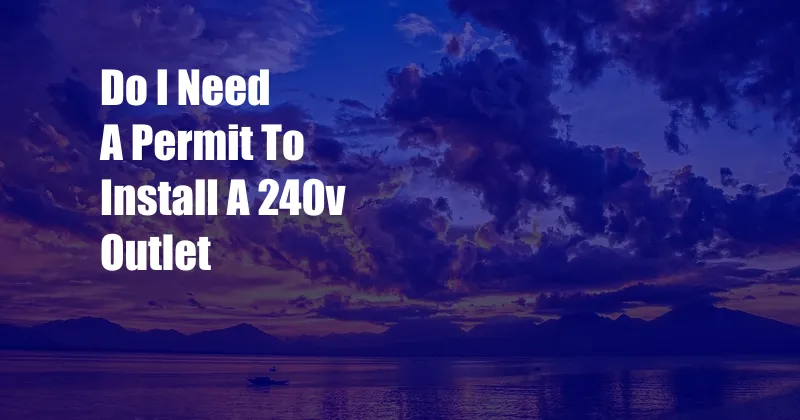
Do I Need a Permit to Install a 240V Outlet?
The world is increasingly reliant on electricity. From our phones to our refrigerators, we depend on a steady flow of power to get through our day. However, not all electrical outlets are created equal. Some outlets, such as 240V outlets, require a special permit to install. In this article, we’ll explore the need for a permit when installing a 240V outlet, providing a comprehensive overview of the topic and sharing tips to ensure a smooth installation process.
If you’re considering installing a 240V outlet in your home, it’s important to do your research. The requirements for permits and inspections can vary from one area to the next. In some cases, you may need to hire a licensed electrician to complete the installation. Here, we’ll provide you with the information you need to make an informed decision. Stay tuned!
240V Outlets: What Are They and Why Do They Need a Permit?
A 240V outlet is a type of electrical outlet that provides 240 volts of power. This is a higher voltage than the standard 120V outlets that are found in most homes. 240V outlets are often used for powering large appliances, such as electric stoves, ovens, and dryers. Because of the higher voltage, it’s important to take special precautions when installing a 240V outlet. That’s why many areas require a permit before you can install one.
A permit ensures that the installation is done safely and up to code. To obtain a permit, you will need to submit plans for your installation to your local building department. The plans will be reviewed by an inspector to ensure that they meet the safety requirements. Once the plans are approved, you will be issued a permit. You will also need to pay a fee for the permit.
Importance of a Permit
There are several reasons why it is important to get a permit before installing a 240V outlet. One reason is that it ensures that the outlet is installed safely and correctly. A licensed electrician knows the building codes and can ensure that the outlet is installed according to those codes. Additionally, a permit ensures that the outlet is properly inspected before it is used. This inspection can help prevent any electrical fires or shocks.
Another reason to get a permit is that it can help protect you from liability. If you install a 240V outlet without a permit and someone gets injured, you could be held liable for any damages. Having a permit can help protect you from these types of lawsuits.
The Permit Process
The permit process for installing a 240V outlet can vary from one area to the next. In general, you will need to submit plans for your installation to your local building department. The plans will be reviewed by an inspector to ensure that they meet the safety requirements. Once the plans are approved, you will be issued a permit. You will also need to pay a fee for the permit.
The permit process can take several weeks, so it is important to start the process early. Once you have obtained a permit, you can begin installing the outlet. The installation process is relatively simple, but it is important to follow all of the safety instructions.
Tips for Installing a 240V Outlet
Here are a few tips for installing a 240V outlet:
- Make sure that you have the proper tools and materials.
- Follow all of the safety instructions.
- Turn off the power to the circuit before you begin working.
- Use a licensed electrician if you are not comfortable installing the outlet yourself.
FAQs
Here are a few frequently asked questions about installing a 240V outlet:
- Q: Do I need a permit to install a 240V outlet?
A: Yes, in most areas you will need to obtain a permit before installing a 240V outlet.
- Q: How much does it cost to get a permit?
A: The cost of a permit varies from one area to the next. However, it is typically around $50.
- Q: How long does it take to get a permit?
A: The permit process can take several weeks.
- Q: Can I install a 240V outlet myself?
A: You can install a 240V outlet yourself if you have the proper tools and experience. However, it is recommended that you hire a licensed electrician to do the job for you.
Conclusion
Installing a 240V outlet can be a challenging task, but it is important to do it safely and correctly. By following these tips, you can ensure that your outlet is installed properly and up to code. Are you interested in learning more about electrical outlets? Let us know in the comments below!